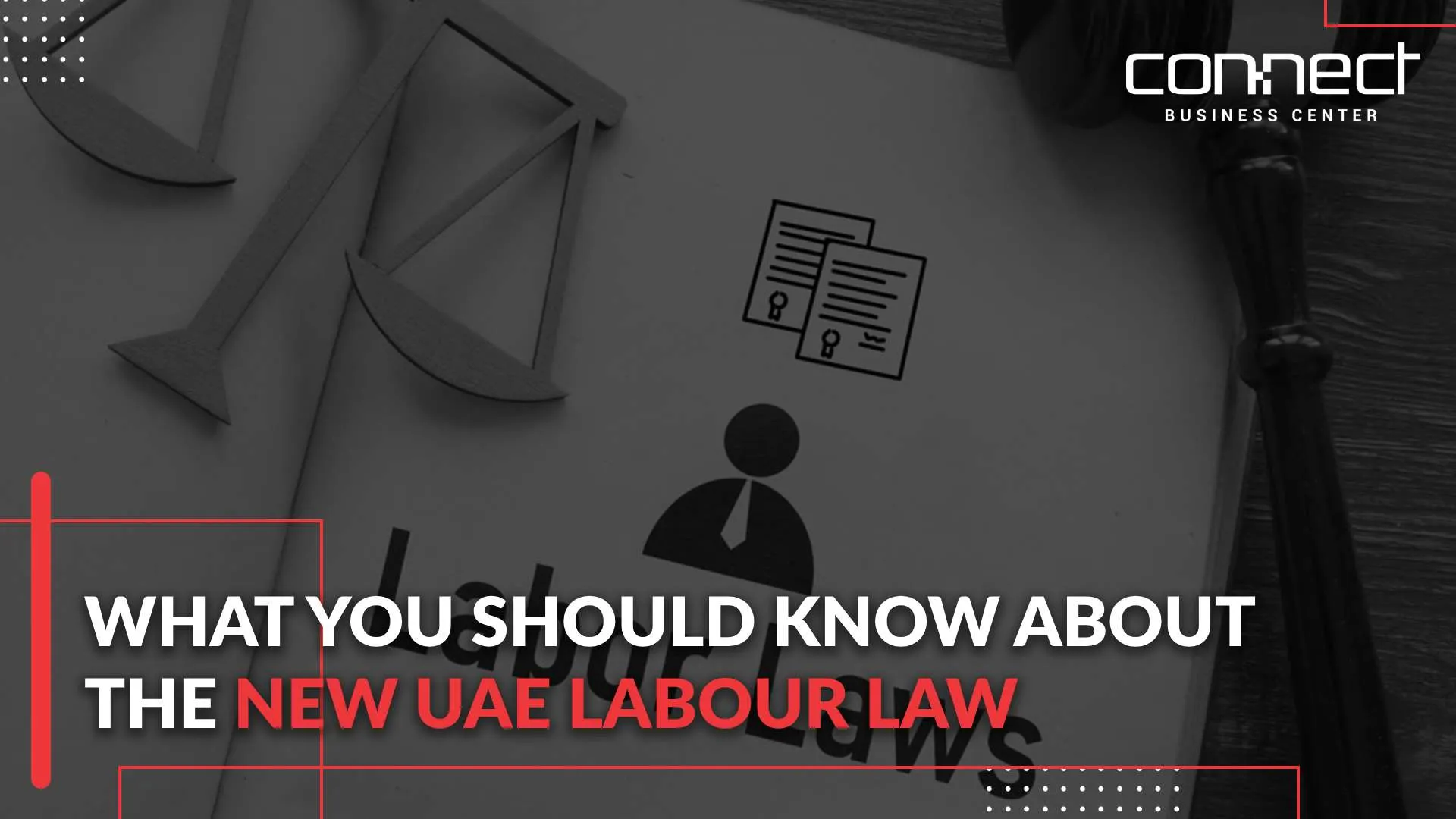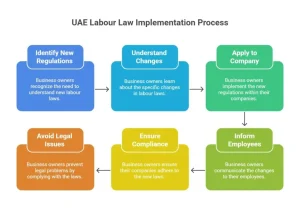UAE labour law governs what happens in companies regarding the labour rights of workers. Therefore, it is necessary, as a business owner, to know what changes I am implementing this year, 2026. Furthermore, with this knowledge, you will be able to apply it to your company and thus avoid problems with labour law authorities.
In this article, you will know what these new changes are in the Emirates and the new employment opportunities it brings. Additionally, you will see the benefits of the labour law.
Benefits of the UAE Labour Law
Before knowing the benefits, we will show you what the new UAE labour law is. Labour law is the rules and regulations that govern the relationship between the employee and the employer. Also, this law was established by Federal Law No. 8 based on business labour relations in the emirates.
Likewise, labour legislation is accompanied by decrees and resolutions that every company must comply with. Similarly, the law applies rules regarding how wages are paid in the private sector and what types of contracts are allowed. Equally, they will be the ones who decide who will help with dispute resolution.
What are the benefits of labour legislation?
Labour laws offer employees additional benefits, apart from fixed salary benefits or compensation. Moreover, benefits may be delivered as a financial factor or as an increase in the basic salary of the employee. Below you will see common examples of benefits that company employees receive:
- The employee provident fund.
- Medical insurance for employees.
- Paid hours.
- Regulatory permits or licenses.
- Maternity and paternity leaves.
- Remuneration, such as a transportation allowance.
- Gratuity.
- Payment of telephone and internet bills, among others.
Furthermore, the benefits are for both Emirati citizens and expatriates working in UAE companies. For example, the UAE labour law about annual leave that workers must receive.
Likewise, although all benefits will be received by employees throughout the country, there are exceptions. Thus, the particular exceptions have to do with the advantages that only Emirati citizens will receive. On the other hand, relations between employers and employees in the private sector are governed by Federal Decree Law No. 33 issued in 2021.
The basics of labour law
This regulation of labour relations and reviews is known as the UAE labour law. Now the labour law dictates the following guidelines for employees:
- Minimum salary. There are no mandatory minimum wages for foreigners working in the United Arab Emirates. Now, the salary a foreign worker earns will depend on the level of education he or she has.
- Working hours. For the private sector, normal working hours are 48 hours or 8 hours a day. Also, school and university weeks will be 4-hour days for people in the public sector. Likewise, if the working hours exceed 5, the employee will have to take work breaks. Additionally, they will not be counted as work hours.
- The employer will pay the employee for overtime at 125% of the base salary. However, if the worker works these overtime hours between 10 pm and 4 am or on days off, they will pay 150%.
- The licenses. Leaves allowed are for illness, maternity, paternity, pilgrimage, studies, and for compassionate reasons.
- The severance pay. The employer will pay the employee with more than 5 years of service, and 1 month of salary.
- Both the worker and his family will receive health insurance in the UAE
New Rules and Regulations in the Private Sector
The UAE Labour Law 2023 was amended by the cabinet and applies some novel regulations. Likewise, the law aims to apply more rights that cover workers.
In the same way, these laws will change the way private companies manage recruitment and employment. An example of this is that there will be short fixed-term contracts and duties, and schedules will be more flexible. In addition, employees will be able to stay in the region for 180 days after their employment contract ends.
On the other hand, regarding shared jobs, the agreements apply so that working university students can change careers. Furthermore, the UAE labour law made very important adjustments regarding the leaves granted to employees.
However, if you are a business owner, it will be your duty to inform your employees of all changes made to the labour law. Hence, if you do not comply with the new regulations strictly, as a private sector company, you will receive legal consequences. As a result, you will suffer costly financial losses from the fines and violations that can result from failing to comply with labour laws.
Finally, the UAE labour law does not allow prejudice to count against any worker based on race, sex, faith, or socioeconomic status. Similarly, this includes nationality or any disability that the worker has. Likewise, harassment against any employee is prohibited by law.
Importance of labour law in the UAE
With the new UAE labour law, the government hopes to improve labour rights and boost the competitive spirit of the country. Furthermore, with the implementation of these laws, they want to attract qualified talent to fill positions in private companies.
Recruitment and employment contracts
UAE labour law states that an employment contract should not exceed 3 years. Likewise, an employer can renew an employment contract, and the validity period will be for the duration of the entire service. Therefore, starting February 1, all contracts will be converted to fixed-term contracts.
Additionally, the MOHRE/free zone contract will remain in force, but with certain modifications. Thus, there are now various forms available depending on the work agreement or visa type.
Employment contracts
In the last Federal Decree Law No. 33 on the Regulation of Labour Relations in the private sector, the fixed-term contract was established. This law came into effect on February 22 of this year, 2023. A fixed-term contract is a contract for a specific period that may be renewed for a similar or shorter time.
For example, if the employer does not renew the contract, upon termination, they may agree to continue with the employment obligations. In this case, the contract is automatically renewed according to the previous terms. Likewise, as an employer, you will have a wide range of particular contracts available to you.
Below are the models for the different work arrangements:
- Full-time. With this, your employee will be able to work for a single employer only full-time.
- Part-time. It is for working with multiple employers during specific hours or days.
- Temporary job. It is to work on a specific task, and the contract will end upon completion of the work.
- Flexible work. Hours or days of employment may change according to the requirements of the employers.
- Remote work. It is for the employee who has all or part of the work performed outside the workplace.
- Job sharing. It is for employees who do shared tasks and duties, distributed among employees as agreed. Likewise, part-time work regulations apply to these contracts.
Probationary period
According to the UAE labour law, a trial period will be a maximum of 6 months and cannot be extended. Likewise, when the worker completes this period and continues working, the employer will count this time as part of the service. Additionally, if the employer decides to terminate the contract during the probation period of the employee, they will have to give the employee 14 days’ notice.
Also, the employer will present the notice in writing to the employee. Now, if the employee wants to change jobs to go to another company, they must notify in writing 1 month in advance. In the same way, the new employer will have to pay the costs of hiring if not otherwise agreed.
Termination of employment
Both workers and employers have the right to terminate an employment contract, complying with the notice and other legal consequences. According to Article 42 of the labour law, a contract may be terminated in the following cases:
- The period of the employment contract will expire, and there are no plans to renew or extend it.
- If the employer and employee agree to terminate the contract in writing.
- In case some of the parties want to terminate the contract and notify the other party within the agreed period.
- Due to the death of the employer.
- Also, it can terminate if it is the employee who dies or is unable to work based on a medical certificate.
- In cases where the worker has a final court ruling restricting freedom for no less than 3 months.
- In case of permanent closure of the company under UAE legislation.
- Due to employer bankruptcy or facing exceptional economic reasons that prevent you from continuing to work.
- If the employee fails to comply with some conditions for the renewal of the work permit, that is beyond the control of employee.
Dismissal on notice
The employee and the employer may terminate the employment contract without prior notice for any of the reasons that we will mention below.
- If you have a false identity or have submitted false documents and certificates.
- If you made a mistake that caused material loss to the employer or deliberately damaged any of the property of the employer.
- By not complying with the instructions regarding the safety of employees in the place where they work.
- If you do not comply with the duties established in the employment contract and continue to do so after the warnings.
- If I disclosed corporate secrets that caused losses or any lost opportunities.
- When found drunk or under the influence of prohibited substances during work hours.
- If you attacked the employer, manager, or colleague during work hours.
- If you leave your job unjustifiably for 20 intermittent days or 7 days in a row.
- Taking advantage of his job, he obtained personal gains.
- In the case of working in another company without respecting the regulations for changing jobs.
Likewise, an employee in the UAE can terminate his or her contract with an employer for the following reasons:
- The employer does not comply with the obligations established in the UAE labour law or the contract.
- For receiving harassment or assault in the workplace, in this case, the employee must notify MOHRE within 5 business days of the incident.
- The employer requests that the worker perform work substantially different from that established in the employment contract.
- It does not solve situations or factors that may harm the health and safety of the employee without full awareness of the risks.
- For arbitrary dismissal.
Notice periods
According to the UAE labour law, the notice period in cases of contract termination for legitimate reasons consists of the following:
- The notice must be in writing
- The party wishing to terminate the contract must give 30 or 90 days’ notice.
Summary dismissal
The Ministry of Human Resources and Emiratisation receives complaints from workers who consider that their dismissal was for an invalid reason. In this case, Article 47 of the law establishes that an illegal dismissal occurs in the following circumstances:
- File a complaint with MOHRE
- File a lawsuit against the employer
In both cases, the validity of the complaint must be legitimate, for which a court will demand that the employer pay compensation to the employee. Additionally, the court will determine the total compensation based on the type of work, the extent of the damage, and the duration of employment. However, the amount should not exceed three months’ salary, according to the last received by the worker.
Similarly, the employee can claim the UAE labour law benefits for termination. In the same way, you may claim the notice period fees and other debts that the employer has with the worker.
End of service gratuity
According to the UAE labour law, a worker with between 1 and 5 years of service can receive gratuity. In this case, the basis of the calculation is 21 days of salary for each year of work in the company. In contrast, workers with more than 5 years of work will receive 30 more days of salary for each year after the first 5.
Conclusion
You must understand the UAE labour law in all its aspects to know your rights as a worker. Likewise, employers must be aware of and apply them to keep their businesses in the UAE compliant. Therefore, if you need more complete information or request some services, you can contact us.
FAQs for UAE Labour Law
What are the most substantial modifications that the new UAE Labor Law makes?
The most significant modifications include getting rid of limitless contracts and requiring fixed-term contracts of no more than three years. It allows easy work schedules, extending parental leave, and adding clear anti-discrimination regulations.
What is the maximum probation period under the new labor law?
The maximum probation period is still six months based on the new labor laws.
How has the kind of contract changed from fixed-term to unlimited?
New employees are unable to sign contracts that last forever. All new job agreements must be renewable, fixed, and for a maximum of three years.
What are the new rights of workers for taking time off, working hours, and dismissal?
Rights include longer paid maternity or paternity leave, a limit of forty-eight hours of work per week, and the right to a gratuity at the end of service, even if you quit, with proper notice.
What changes do firms need to make to their HR practices to follow the new labor law?
Employers must change all of their limitless contracts to fixed-term ones, change their policies for flexible work models, change their termination processes to include notice periods, and make their anti-discrimination provisions stronger.





